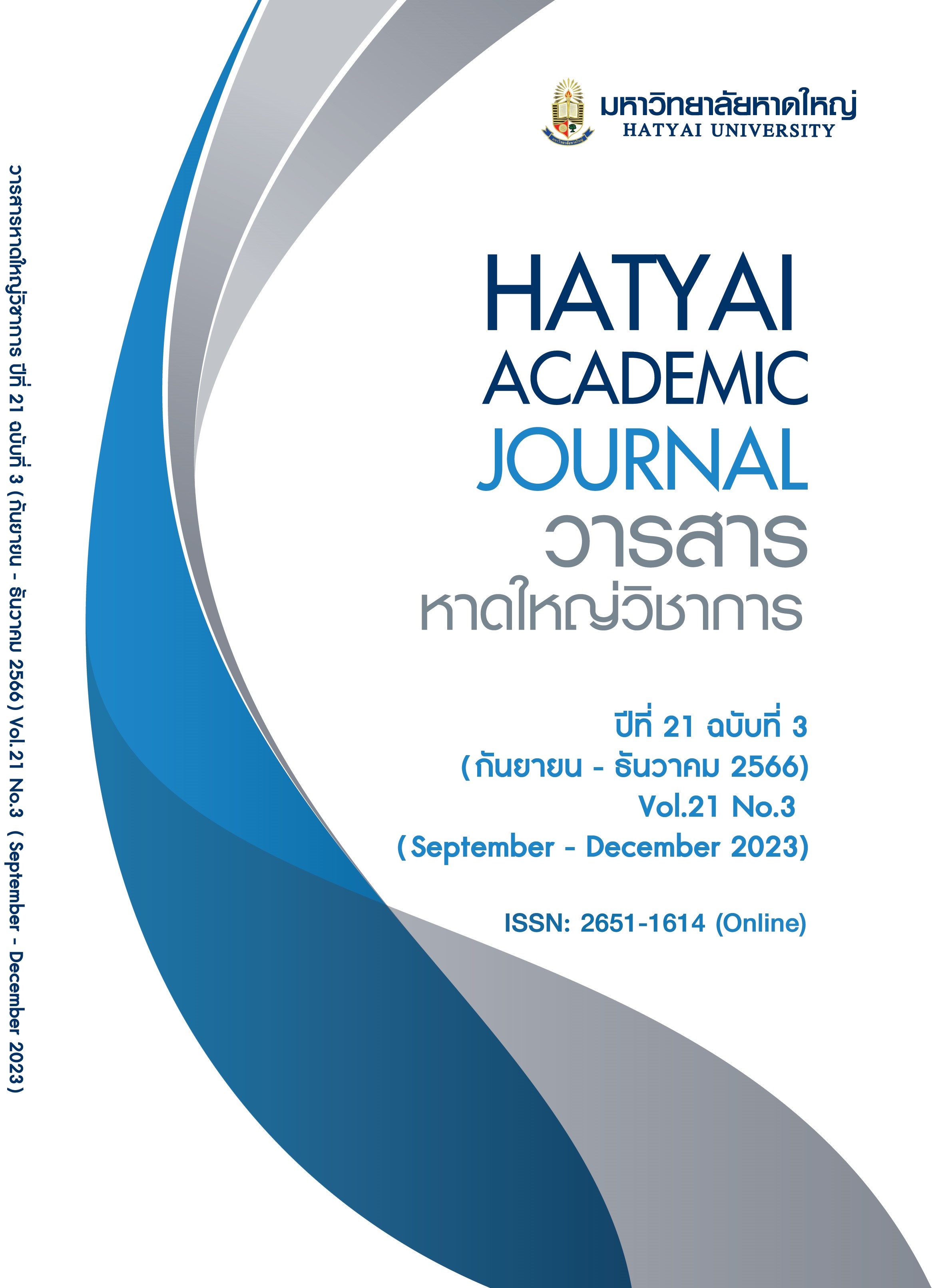The Management of Kratom Knowledge from Local Wisdom to a Community Enterprise Production System in Tambol Kuan Suban, Amphoe Ban Na San, Suratthani Province
Main Article Content
Abstract
This research aimed to study 1) the management of kratom knowledge based on local wisdom, and 2) the improvement of kratom knowledge to become a community enterprise. This research was conducted through a qualitative approach, a case study that acquired information from literature reviews, and an interview with five key informants. The researcher used descriptive analysis from the information acquired. The findings reflected that kratom had been used by community locals in various ways for a long time, and the knowledge on species, cultivation, storage, and processing had been accumulated and passed on from one generation to the next. The utilization of the plant in Thai traditional medicine was based on wisdom passed from ancestors. Today, after the plant was no longer legally prohibited, knowledge related to such wisdom and utilization of kratom has been improved and expanded by the community. The incorporation of a community enterprise named “Kuan Suban Community Enterprise for Sustainable Agriculture” not only adds value for commercial purposes but also preserves the local wisdom. This will strengthen the group of locals to earn income and be a proper model of knowledge management from local wisdom to create economic values for other communities.
Article Details

This work is licensed under a Creative Commons Attribution-NonCommercial-NoDerivatives 4.0 International License.
All published articles are evaluated by three qualified peer reviewers from various institutions through a double-blind process, where reviewers do not know the authors’ identities and authors do not know the reviewers’ identities. The content and articles in the Hatyai Academic Journal reflect the authors’ views only and are neither the opinions of the editorial board nor the responsibility of Hatyai University. The Editorial Board of the Hatyai Academic Journal allows articles to be reproduced for academic purposes, on the condition that the original source is clearly cited.
References
Asanangkonchai, S. (2020). Summary of kratom, center for the study of addiction problems. Songkhla: Faculty of Medicine, Prince of Songkla University. [in Thai]
Boondamnoen, T. (2014). A comparative study of the ratio of solvents used to extract Mitragynine from kratom leaves (Research report). Nakhon Sawan: Nakhon Sawan Rajabhat University. [in Thai]
Chansirimongkol, B. (2009). A study of the symptomatic effects found in kratom users at the outpatient department Suan Saranrom Hospital. Journal of Somdet Chaopraya Institute of Psychiatry, 3(1), 41-53. [in Thai]
Chimphet, D. (2022, March 25). Deputy chief executive of the SAO (interview). [in Thai]
Chuayraksa, W. (2017). Community enterprise development guidelines: A case study of indigo-dyed cotton women group at Ban Tham Tao, Sakon Nakhon Province (Master’s thesis). Burapha University, Chonburi. [in Thai]
Kaewkwankrai, T. (2017). The way to survive the economic crisis through the community enterprise approach. Academic Journal of Buriram Rajabhat University, 9(2), 33-50. [in Thai]
Khongleng, P. (2022, March 4). Village headman (interview). [in Thai]
Klaewom, C. (2022, March 25). Community sage (interview). [in Thai]
Makboon, S. (2022, March 18). Chief executive of the SAO (interview). [in Thai]
Mayeng, F., Khamkaew, D., Onchan, P., & Muhamad, C. (2020). The wisdom in utilization of kratom from local healers: A case study in a community in Southern Thailand. RBRU Journal of Humanities and Social Sciences, 1(2), 66-75.
Mueandao, K. (2018). Comparison of mitragynine extraction methods for forensic science and antibacterial activity from kratom (Master’s thesis). Silpakorn University, Bangkok. [in Thai]
Nuanchuen, C. (2018). Guidelines for sustainable development of community enterprises with local wisdom: Case study of community enterprises in Nakhon Phanom and Sakon Nakhon Provinces (Research report). Bangkok: National Defense College. [in Thai]
Panich, V. (2003). Knowledge management in the era of knowledge-based society and economy. Bangkok: Institute for the Promotion of Knowledge Management for Society. [in Thai]
Panyaphu, D. (2016). Kratom: Herbs or drugs. Journal of Thai Traditional and Alternative Medicine, 14(3), 242-256. [in Thai]
Petkaew, C. (2004). Upgrading and applying local wisdom in the current situation. Thai Journal, 3(3), 14-21. [in Thai]
Promchai, A., & Suwanachot, S. (2011). The success of Huaykan Community Enterprise. Local Administration Journal, 4(2), 16-29.
Rungrueng, W. (2020). Toxicology of kratom plants. Journal of Hospital Pharmacy, 30(2), 118-124. [in Thai]
Smitinan, T. (2014). Name of plants of Thailand. Bangkok: Ministry of Natural Resources and Environment. [in Thai]
Sukprasert, P. (2015). Local wisdom and agricultural promotion. Bangkok: Faculty of Agriculture, Kasetsart University. [in Thai]
Thanissaro, P. (2020). Knowledge management: Human development process and job development. Journal of Roi Kaensarn Academi, 5(2), 197-203. [in Thai]
Thongtakorn, P. (2022, March 11). Agriculturist (interview). [in Thai]
Wangsinthaveekul, C. (2017). Kratom. Songkhla: Center for Continuing Education in Pharmacy, Prince of Songkla University. [in Thai]
Wongpisan, U. (2016). The transfer of local knowledge on organic rice farming by farmers in Eastern Thailand. Valaya Longkorn Research and Development Journal, 11(3), 281-293. [in Thai]


